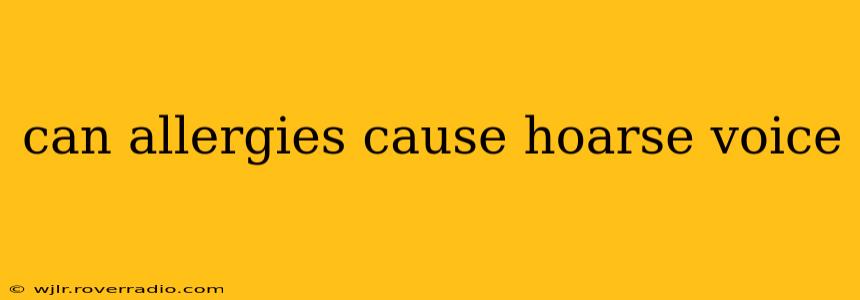Yes, allergies can absolutely cause a hoarse voice. While not the most common symptom, a hoarse voice is a possible manifestation of allergic rhinitis (hay fever) and other allergic reactions. This happens due to the inflammation and irritation triggered by the allergic response in the upper respiratory tract. Let's delve deeper into how this connection works.
How Allergies Lead to a Hoarse Voice
Allergies occur when your immune system overreacts to harmless substances like pollen, pet dander, dust mites, or certain foods. This overreaction triggers the release of histamine and other inflammatory chemicals. These chemicals cause the blood vessels in your nasal passages and throat to swell, leading to various symptoms including:
- Runny nose: Excess mucus production contributes to post-nasal drip.
- Sneezing: Your body's attempt to expel allergens.
- Coughing: Irritation in the throat and airways from post-nasal drip and inflammation.
- Itchy throat: Direct irritation from allergens and inflammation.
- Hoarse voice: This is a result of the inflammation and irritation of your vocal cords. The swelling can make your vocal cords vibrate differently, resulting in a raspy, breathy, or strained voice. Constant coughing can further exacerbate this.
What Other Symptoms Might Accompany a Hoarse Voice Due to Allergies?
Often, a hoarse voice from allergies isn't an isolated symptom. You might also experience:
- Congestion: Stuffiness in your nose and sinuses.
- Post-nasal drip: Mucus dripping down the back of your throat.
- Sneezing fits: Frequent and sometimes forceful sneezing.
- Itchy, watery eyes: Inflammation of the conjunctiva.
- Fatigue: The body's response to inflammation and the effort of fighting the allergic reaction.
How Long Does a Hoarse Voice from Allergies Last?
The duration of a hoarse voice from allergies varies depending on the severity of the allergic reaction and how well the allergy is managed. For mild allergies, the hoarseness might only last a day or two, resolving as the inflammation subsides. However, with more severe or untreated allergies, hoarseness can persist for several days or even weeks.
When Should I See a Doctor About a Hoarse Voice?
While a temporary hoarse voice due to allergies is usually not cause for concern, you should consult a doctor if:
- The hoarseness persists for more than two weeks. This could indicate a more serious underlying condition.
- You experience significant difficulty speaking or breathing.
- You have other concerning symptoms, such as a high fever, difficulty swallowing, or persistent coughing.
- Over-the-counter allergy medications aren't providing relief.
Can Allergies Cause a Permanent Hoarse Voice?
While generally allergies do not cause permanent hoarseness, severe or chronic untreated allergies can contribute to long-term vocal cord inflammation. This prolonged inflammation can potentially lead to vocal cord nodules or polyps, which may necessitate medical intervention.
How to Treat a Hoarse Voice Caused by Allergies
The best approach to treating a hoarse voice stemming from allergies is managing the allergy itself. This typically involves:
- Identifying and avoiding allergens: This is crucial for long-term relief.
- Using over-the-counter allergy medications: Antihistamines, decongestants, and nasal corticosteroids can help reduce inflammation and relieve symptoms.
- Drinking plenty of fluids: This helps thin mucus and keep your throat moist.
- Resting your voice: Avoid excessive talking or shouting to allow your vocal cords to heal.
- Using a humidifier: This adds moisture to the air, which can soothe irritated throat tissues.
Addressing the underlying allergic reaction is key to resolving a hoarse voice caused by allergies. If symptoms persist or worsen, consulting an allergist is recommended for proper diagnosis and treatment. Remember, this information is for general knowledge and does not constitute medical advice. Always consult a healthcare professional for any health concerns.
